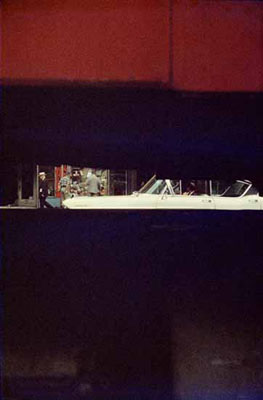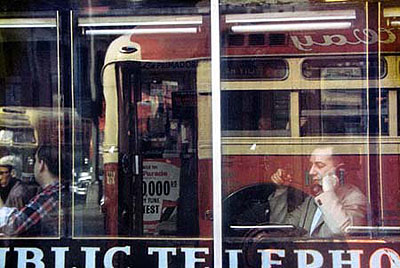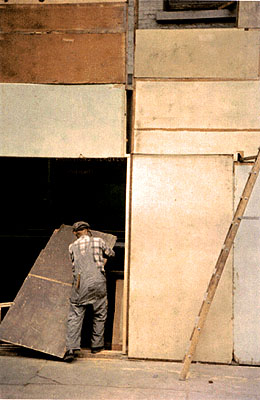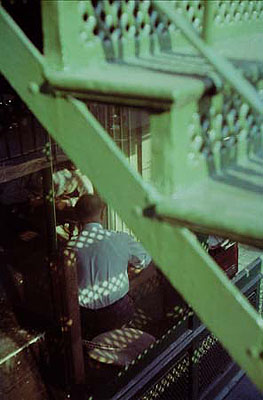
Chromogenic Print, Printed at a later date. 35 x 28 cm
Saul Leiter »
Early Colour 1948-1959
Exhibition: 28 May – 4 Jul 2008
Faggionato Fine Art
49 Albemarle St
W1S 4JR London
+44 (0)20-74097979
info@faggionato.com
www.faggionato.com
Mon-Fri 10-17

Faggionato Fine Arts is pleased to announce the first solo exhibition in the UK of the groundbreaking early colour work by the American photographer Saul Leiter, Early Colour 1948 - 1959. The exhibition is in association with the Howard Greenberg Gallery, NY, and focuses on his images of New York street scenes. Born in Pittsburgh in 1923, it was in his teens that Leiter's interest in art began and in 1946 he abandoned studying theology and moved to New York, to pursue his interest in painting. He exhibited with Philip Guston and William de Kooning and it was through another abstract artist Richard Pousette- Dart that he was introduced to photography. This friendship and meeting W. Eugene Smith, coincided with the photography exhibitions he saw in New York at the time, all of which inspired his growing involvement with the medium. His first exhibition of colour photography was at the Artist's Club in the 1950 (a meeting place for many Abstract Expressionist painters) while Edward Steichen had included Leiter's black and white images in Always the Young Stranger at MOMA, NY, in 1953. In the late 1950's Henry Woolf published Leiter's colour fashion images in Esquire and later in Harpers Bazaar. For the next 20 years he worked as a fashion photographer for Elle, British and French Vogue and Nova. However, Leiter seemed to almost drop out of public view sometime in the 60s, until 2006 when the process of being rediscovered started. In both his fashion and more personal work Leiter has made an enormous contribution in the area of colour photography. His distinctively subdued colour and abstracted forms often have a painterly quality that stand out among the work of his contemporaries. In her book The New York School: Photographs 1936-1963, Jane Livingston writes, "The very fact that color becomes the subject of the photographs places Leiter's work in another realm—a realm that is unabashedly artistic." Martin Harrison, editor and author of Saul Leiter Early Color, writes, "Leiter's sensibility…placed him outside the visceral confrontations with urban anxiety associated with photographers such as Robert Frank or William Klein. Instead, for him the camera provided an alternate way of seeing, of framing events and interpreting reality. He sought out moments of quiet humanity in the Manhattan maelstrom, forging a unique urban pastoral from the most unlikely of circumstances." These street-scenes are half-hidden, veiled, fragmented; incorporating muted tones and simple forms but cropped at unconventional angles, in Mondrian Worker, 1954; colour and line are composed in almost mathematical balance. In Phone Call, 1957; surfaces are further obscured with shadows and reflections creating multiple layers. It is this confusion in photography that Leiter enjoys, when "we do not know why (or what) we are looking at it, and then , all of a sudden, we discover something we start seeing". Saul Leiter's work is in the collections of the Museum of Fine Arts, Houston; the Art Institute of Chicago; the Baltimore Museum of Art; the Victoria and Albert Museum; the National Gallery of Australia; the Whitney Museum of American Art; the Milwaukee Art Museum; the Yale University Art Gallery; and other prestigious public and private collections.

